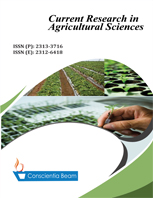Status and measures of food insecurity in Karnali province of Nepal
DOI:
https://doi.org/10.18488/cras.v11i2.4024Abstract
Food insecurity has been prevailing in the province for more than decades. Province lacks complete study on measures of food insecurity. So, an experiment and discussion with self-observation were conducted throughout the years to determine status and measures of food insecurity in Karnali, Nepal. The research was conducted in Jumla, Mugu & Surkhet of Karnali province with Split-plot design including two or three (as per technical requirement) mini plots to compare intensified or non-intensified cropping/inputs, conservational farming vs. non-conservational farming (three mini plots), artificial pollination vs natural pollination, and crop field protected with insect net vs. without net (part of plant protection), as part of experiment and field trials. Observation and self-study from various projects were carried out to determine status or opportunities of modern farming, drought resilient agriculture, value addition, and promotion of cereals/pseudo-cereals. KII (Key Informant Interview) and FGD (Focus-Group Discussion) conducted with farmer groups (Number:25) and government officials to determine the situation of food security and programs or policy influencing opportunities in the province. Application of innovative tools, technologies and skills through crop or rice intensification, conservational farming, breeding or genetic make-up, crop protection from insect/pest, opportunities of value addition centers, modern farming, and drought resilient agriculture with promotion of cereals or pseudo-cereals and policy influencing or advocacy opportunities have found most effective and sustainable methods of crop improvement for the potential measures of food insecurity in the province. Therefore, the study would support researchers to understand the contextual implications of food security in the province.

